Key takeaways:
- Fiber is essential for digestive health, improving regularity and overall well-being.
- There are two types of fiber: soluble (helps lower cholesterol) and insoluble (adds bulk to stool).
- Increased fiber intake can stabilize energy levels, support heart health, and assist in weight management.
- A balanced diet incorporating both types of fiber can enhance digestive health and support gut bacteria.
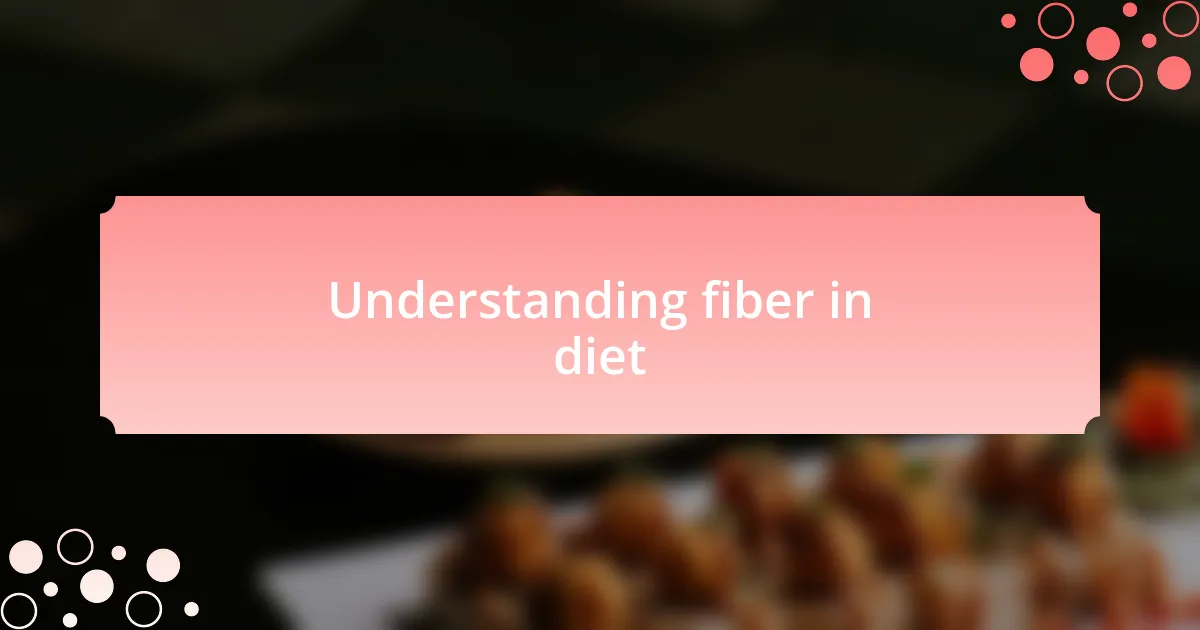
Understanding fiber in diet
Fiber plays a crucial role in our diet, acting like a superhero for our digestive system. I remember a time when I struggled with bloating and discomfort after meals; it was then that I learned how essential fiber is for keeping everything running smoothly. After incorporating more fiber-rich foods into my meals, like fruits, vegetables, and whole grains, I noticed a significant difference in my overall well-being.
Not all fiber is created equal, though. There are two types: soluble and insoluble fiber. Soluble fiber, found in foods like oats and beans, absorbs water to form a gel-like substance, helping to lower cholesterol and stabilize blood sugar levels. On the other hand, insoluble fiber, present in whole grains and leafy vegetables, adds bulk to our stool, aiding in regularity. Have you ever taken a closer look at what you’re eating? I used to overlook how these fibers could affect my daily energy levels and digestion until I started paying attention.
Making a conscious effort to increase my fiber intake has been quite the eye-opener. I instinctively reach for a fresh apple or a hearty quinoa salad now, and it feels like a small victory each time. It strikes me how often fiber is overlooked, yet it contributes to a vital part of our health. So, what about you? What little changes can you make today to welcome more fiber into your meals?
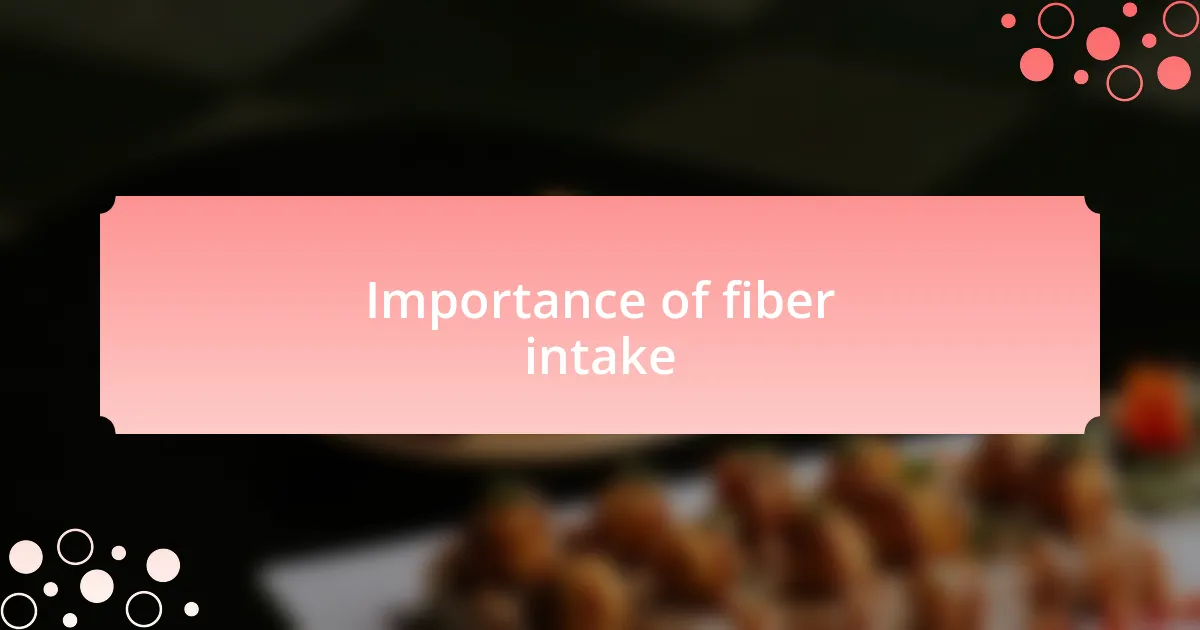
Importance of fiber intake
Fiber intake is essential for maintaining a healthy digestive system, but its benefits extend far beyond just digestion. I remember feeling sluggish and weighed down before I fully understood how fiber could naturally energize my body. Now, I find that including more fiber in my meals helps keep my energy levels stable throughout the day—what a game changer! Have you ever experienced that mid-afternoon slump? Increasing fiber can truly help in avoiding those dips.
Another significant aspect of fiber intake is its role in heart health. When I learned about the connection between soluble fiber and cholesterol levels, I was astonished. Foods like avocados and lentils not only taste great, but they also work to keep my heart healthy. It’s fascinating how something as simple as adding a bit more fiber to my diet can have such an impact on my long-term well-being; what changes can you make in your own meals to support your heart?
Moreover, fiber is also a key player in weight management. I recall a time when I struggled with snacking mindlessly. Once I began focusing on my fiber intake, I found myself feeling fuller for longer after meals. This shift meant that I was less likely to reach for those unhealthy snacks between meals. It’s a remarkable realization—how does something so simple, like fiber, have the power to change our eating habits? Exploring fiber-rich options can lead to healthier choices and a more balanced lifestyle.
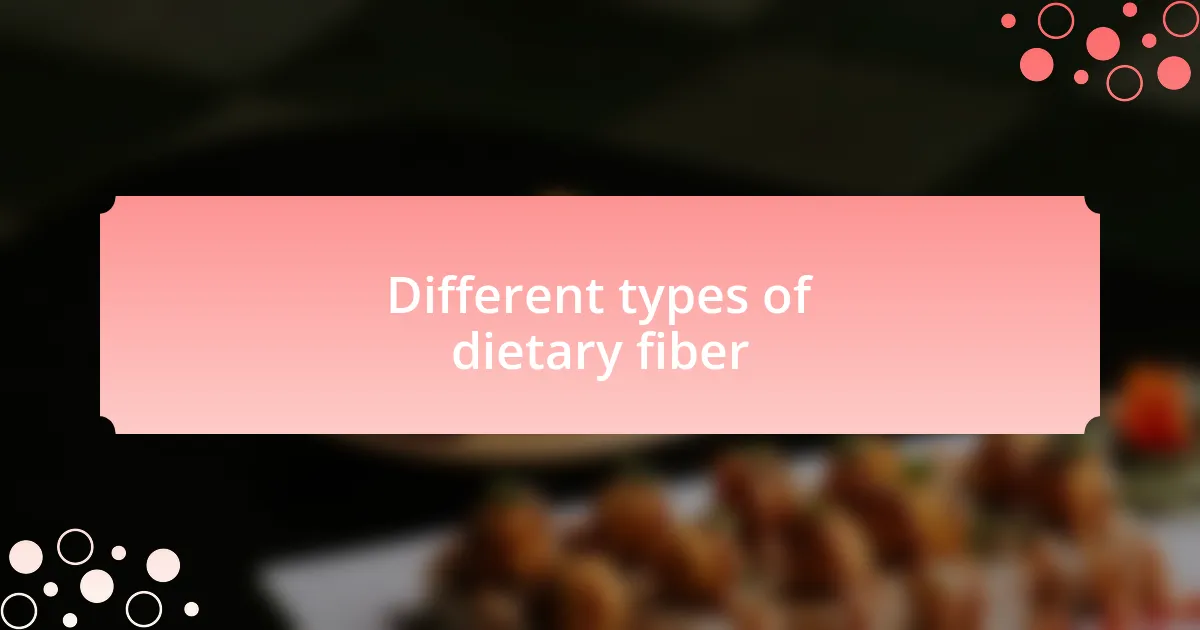
Different types of dietary fiber
Dietary fiber comes in two main types: soluble and insoluble, each playing distinct roles in our diets. Soluble fiber dissolves in water, forming a gel-like substance that slows digestion. When I first incorporated foods like oats and beans into my breakfast, I was amazed at how satiated I felt throughout the morning. Have you ever noticed how a good meal can keep your cravings at bay?
In contrast, insoluble fiber adds bulk to your stool and helps food pass through your digestive tract more efficiently. I vividly recall a friend who struggled with digestive issues until she started eating more whole grains and vegetables. It’s incredible how something as simple as brown rice or a hearty salad can make a significant difference in our regularity. Isn’t it fascinating how tiny changes can lead to such impactful outcomes?
Furthermore, I’ve realized that mixing both types of fiber in my meals creates a balanced approach to my diet. For instance, enjoying a chia pudding topped with fresh fruit not only promotes heart health but also keeps my gut happy. Why not think about how you can combine these fiber sources in your meals for a little extra nutritional boost?
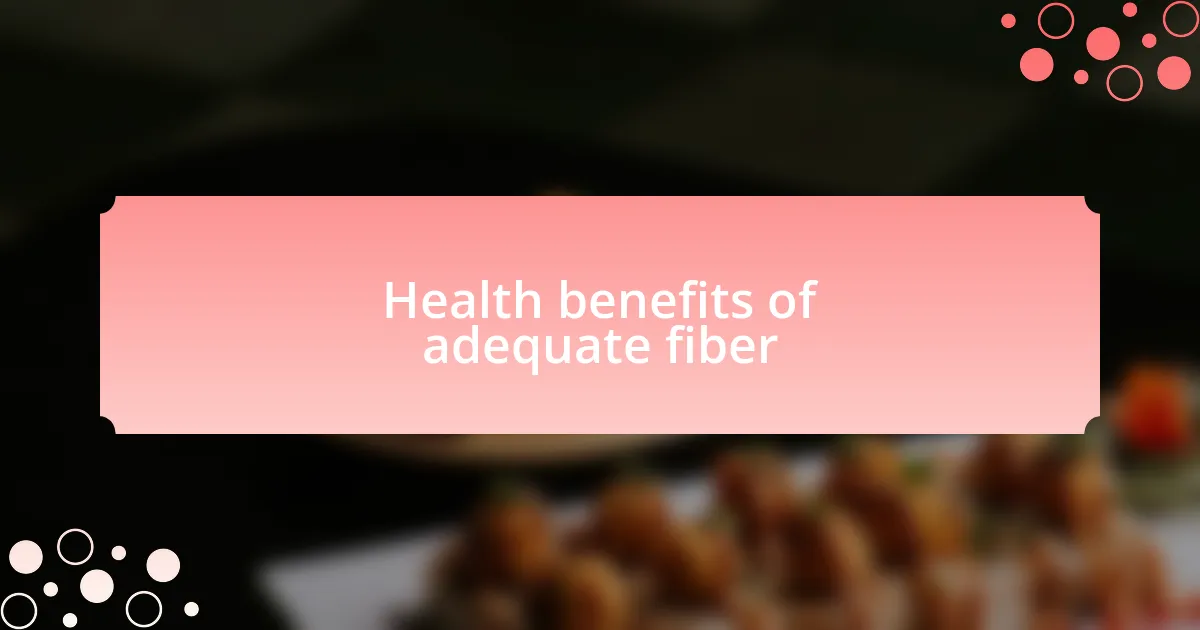
Health benefits of adequate fiber
Adequate fiber intake offers a wealth of health benefits that truly transform our well-being. I remember when I started tracking my fiber intake; I was surprised to learn how fiber can lower cholesterol levels. After working on my diet to include more fiber-rich foods like avocados and lentils, my regular check-ups showed a marked improvement in my numbers. Have you ever experienced a health change that made you feel empowered to continue your journey?
Moreover, fiber plays a key role in maintaining a healthy weight. I’ve often found that days filled with fiber-packed meals leave me both satisfied and less tempted by unhealthy snacks. Have you noticed how a nutrient-dense lunch can keep you energized and focused without those pesky cravings creeping in later?
Additionally, fiber can help stabilize blood sugar levels, which is particularly beneficial for those with diabetes. I still recall a time when a friend of mine managed to improve her blood sugar control simply by integrating more fiber into her diet. It’s truly motivating to think about how the foods we choose can influence our health in such significant ways. Wouldn’t you say that our daily choices are powerful tools in managing our overall health?
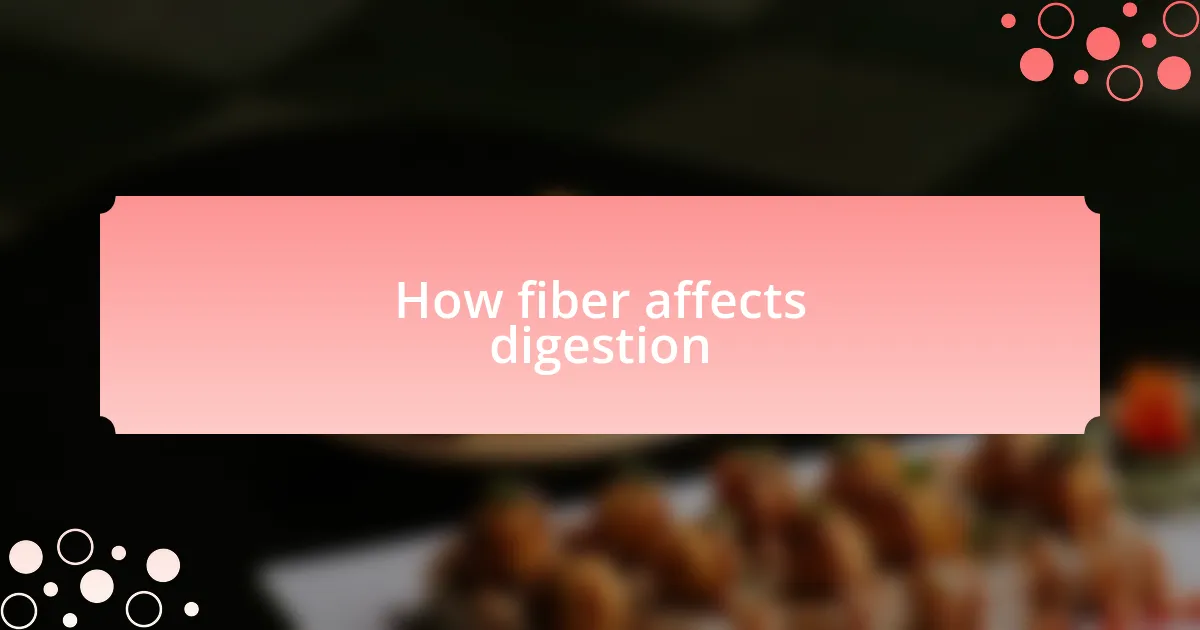
How fiber affects digestion
Fiber has a remarkable effect on digestion, largely due to its ability to promote regular bowel movements. I still remember the relief I felt when I switched to a fiber-rich diet; my digestive system just seemed to come alive. Have you ever noticed how incorporating more whole grains and fruits can lead to that satisfying feeling of comfort after a meal?
Moreover, fiber adds bulk to our stool, which helps maintain a healthy gut environment. I used to struggle with occasional bloating, but once I made it a habit to include veggies like broccoli and beans in my meals, I felt a noticeable difference. Isn’t it incredible how something as simple as adjusting your plate can change how your body feels?
On a deeper level, fiber doesn’t just assist in digestion—it also plays a crucial role in feeding the good bacteria in our gut. This interaction is fascinating; I often think about how our dietary choices can create a thriving ecosystem within us. How empowering is it to know that by choosing fiber-rich foods, we’re enhancing our digestive health and overall well-being?

My personal fiber intake journey
One pivotal moment in my fiber intake journey occurred during a routine grocery trip when I stumbled upon a vibrant section of fresh produce. I vividly recall filling my cart with colorful fruits and vegetables, feeling a wave of excitement as I imagined the dishes I could create. It was as if I had uncovered a treasure trove, and I couldn’t help but wonder: how many overlooked options are out there just waiting to enrich our diets?
Integrating fiber into my meals wasn’t always smooth sailing, though. I remember one particular week where I overdid it on the chickpeas, and let’s just say my digestive system quickly reminded me about moderation. That experience taught me a valuable lesson about balance, highlighting how even positive changes in our diet need to be approached thoughtfully. Have you experienced a similar hiccup on your journey towards healthier eating?
As I embraced this fiber-rich lifestyle, I started noticing small victories, like sustained energy levels after meals. It was exhilarating to feel lighter and more energized without the sluggishness I once felt after refined meals. I often reflect on how empowering it is to make choices that genuinely fuel our bodies. It’s not just about the food; it’s about the feeling of empowerment that comes from taking control of our health journey.